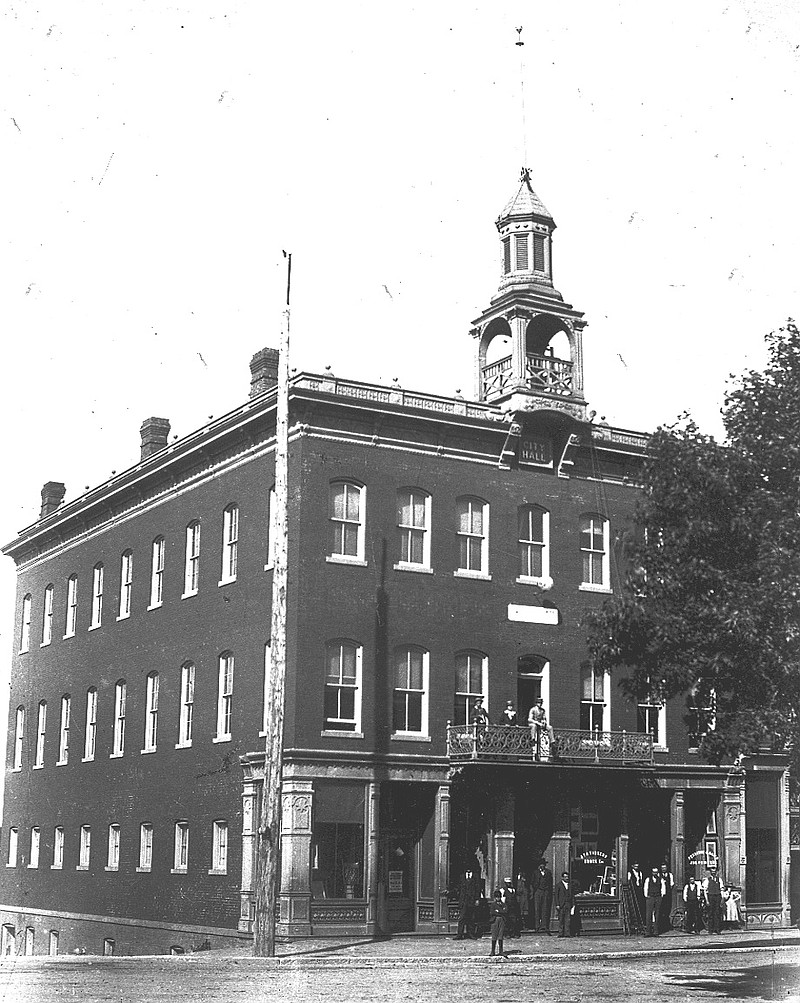An impressive mausoleum built for an impressive Jefferson City businessman sits prominently in Woodland-Old City Cemetery overlooking McCarty Street. The monument made of Carthage limestone is the final resting place of Maj. Joseph Marcus Clarke, a wealthy newspaper man, real estate investor, builder, banker and businessman. When he died in 1889, the Cole County Circuit Court and all of the businesses in Jefferson City were closed for his funeral service, which was held at the Christian Church. He was placed in the family mausoleum with his son Junius, who had died in 1878. Joseph's wife, Lavinia Clarke, joined them in 1901.
J. M. Clarke was born in 1814 in Clermont County, Ohio, and at the age of 20 became a teacher. A year later, he joined his brother in the newspaper business in Illinois but soon left that venture to become a horse-trader in Alabama and Virginia.
In about 1836, he married his first wife, Eliza Ligon, in Amelia County, Virginia, and they lived on a plantation there. Eliza died in 1843, and in 1845, he married Lavinia Nunnelly. They moved to Kentucky, where he engaged in merchandising. Joseph Clarke had 12 children by his two wives; only three of his children reached maturity, and all of them predeceased him.
In 1854, the Clarkes moved from Kentucky to Missouri and settled on land in Osage County. Here, Joseph ran a profitable plantation and represented that county for two terms in the Missouri Legislature. He owned valuable farms in Missouri, Kentucky and Ohio as well as extensive holdings in Chicago, Illinois.
During the Civil War, he moved back to Kentucky and returned to the newspaper business. In 1874, he sold the paper and came back to Missouri, settling in Jefferson City where he lived for the remainder of his life at the corner of East Main and Monroe streets.
He erected the block-long "Clarke's Row" residences on Capitol Avenue, which were torn down in the 1940s when the state purchased the property. He was stockholder and president of the First National Bank and president of the Merchant's Bank, which he built on the southwest corner of High and Jefferson streets. Merchant's Bank opened Dec. 2, 1889, and Joseph Clarke died five days later.
Clarke was a civic-minded philanthropist. He is regarded as the founder of the Christian Church and donated generously to the construction of its building. In his will, he left a $1,000 endowment with the interest to be used to pay the pastor's salary.
J. M. Clarke left half of his estate to his wife. The balance, including extensive property holdings, was distributed among assorted friends, relatives and tenants.
To the City of Jefferson, he bequeathed a building known as Bragg Hall at the southwest corner of High and Monroe streets. There was a stipulation that the city had to raise the sum of $3,000 to pay for a life-sized bronze statue of Mr. Clarke that was to be placed in one prominent room of the building along with portraits of his wife, Lavinia Clarke, and two sons, Junius and Marcus L. The city would also be required to maintain in perpetuity, the family burial vault at Woodland-Old City Cemetery. Additionally, there was a provision that if public use ended, the building would revert to the Clarke family heirs. At this time, the building was valued at $15,000.
In 1946, there was talk of selling Bragg Hall. By this time, Hermann's Department Store rented the first floor and basement, and City Hall occupied the remainder of the building. The city retained an attorney to look into the sale, but nothing was resolved. In 1974, Mayor John G. Christy again raised the issue that existing quarters were not adequate to serve the needs of the government, citing the fact that city offices were spread out over the city. Officials were looking forward to the day when a new city hall could be erected at the corner of Monroe and McCarty streets. However, revenue from the sale of Bragg Hall would be needed in order to fund this, and city officials were reluctant to take action for the fear they would be challenged by a Clarke heir who felt the provisions of the will were being violated.
Eventually, Bragg Hall was sold, and the new City Hall was opened in 1983. The bronze statue of Mr. Clarke and portraits of Mrs. Clarke and their two sons were moved to the new building, but there didn't seem to be an appropriate place to display them. So in October 1987, the city reached an agreement with Clarke heirs and the newly constructed Clarke Nutrition Center on Myrtle Avenue was dedicated to Joseph M. Clarke. The statue and portraits were moved to the dining room, where they are now prominently on display.
Nancy Arnold Thompson is a retired medical administrator and former member of the Cemetery Resources Board for the City of Jefferson. Her hobby is cemetery preservation and restoration.

